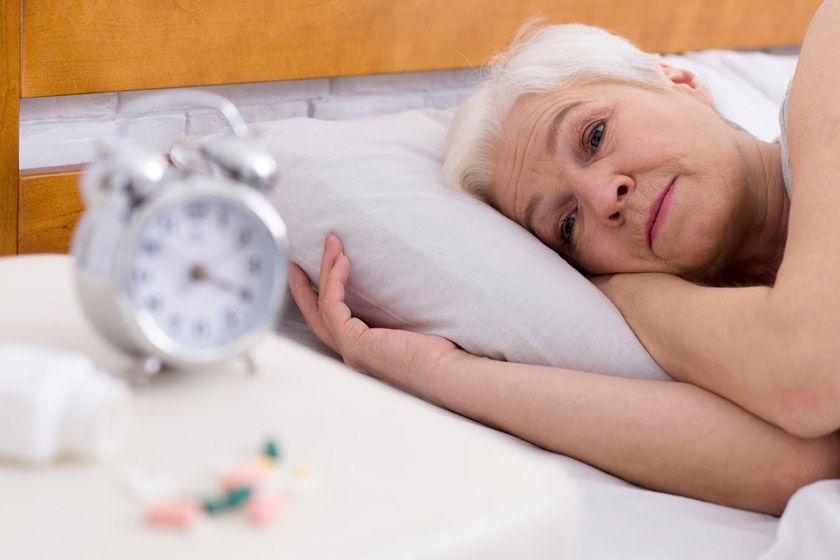
According to an article published on Livingmaples.com/mag as Seniors Sleep: Best Practices for Better Sleep: Sleep deprivation and poor quality sleep have numerous negative effects. It may be physiological, such as an increased risk for stroke, heart disease, and high blood pressure. The negative effects can also develop psychologically, such as an increase in irritability, anxiety or depression.
There's a myth that older adults need less sleep, but it is not valid. Regardless of how hard it is for older adults to get enough sleep, they still require the same amount of sleep. Between childhood and adulthood, sleep requirements tend to decrease, but the decline stops around age 60. For people aged 65 and over, seven to eight hours of sleep per night is recommended. As we age, our sleep patterns change; we may sleep shorter, wake up earlier, or become sleepy earlier. Still, waking up tired every morning, experiencing disturbed sleep, and experiencing other insomnia symptoms are not signs of healthy ageing.
Sleeping tips for older adults
Older adults need a similar amount of sleep each night to all other adults - about 7 to 8 hours. However, older people tend to head to bed a little earlier and get up a little earlier than they did in their youth. It is common for older adults to experience changes in their sleep-wake cycle. Several factors can contribute to this, including age, lifestyle, and illness. The chemicals and hormones in your body can also influence your sleep. Melatonin, for example, a naturally occurring hormone associated with sleep, is less produced as you age. Certain lifestyle factors can influence your sleep. Alcohol and caffeine are two examples. If you have trouble falling asleep now and then, the tips below can help you.
- Avoid napping in the late afternoon or evening. Napping may keep you awake at night.
- Try not to watch television in the bedroom or use your cell phone or computer. These devices emit light that makes it difficult to fall asleep.
- Keep a regular sleeping schedule. Even while travelling or at the weekend, get up and go to sleep simultaneously each day.
- During the night, you should limit your fluid intake.
- Try to maintain a comfortable temperature and keep your bedroom quiet as much as possible.
- Don't eat large meals right before bedtime because large meals can keep you awake. Also, do not eat in bed; use your bed only for sleep.
- Exercise has numerous health benefits for older adults besides helping them fall asleep easier at night. It's best to exercise every day regularly, but not within 3 hours of going to bed.
- Before going to bed, avoid smoking. You should also avoid drinking alcohol before bedtime.
- Try Hatha or Nidra yoga.
- Make sure you get some sunlight every day.
- Drink herbal teas like chamomile or valerian root tea. Before starting a new herbal tea routine, talk to your doctor about possible drug interactions.
- Ask your doctor whether any of your medicines are causing the issue. Several medications can disrupt sleep, including beta-blockers, antidepressants, and cardiovascular drugs.
- And finally, if you are not asleep after half an hour, get up and go to a different room. Try doing something relaxing like meditation, reading or listening to music. Do not use your phone or laptop.
Benefits of Good Sleep for Seniors
No matter how old you are, sleep is an essential mechanism. It can restore energy levels and heal both physical and cognitive damages. Sleep is equally essential for the health of the body and the mind. Our bodies recover any damage done to the cells during the day by getting a good night's sleep and booster our immune system by recovering from daytime stress. Well-regulated sleep has many benefits, including:
Blood sugar: Getting enough sleep helps older adults maintain a steady blood sugar level.
Weight management: Sleeping is an essential factor when it comes to weight loss or weight maintenance. Getting enough sleep helps us have an enhanced metabolism and a healthier appetite.
Depression and anxiety: A good night's sleep can be an essential component of depression management. It also helps us have less stress and anxiety.
Alertness: Having a healthy sleeping habit helps you increase alertness during waking hours.
Memory and concentration: The benefits of good sleep for seniors go far beyond just resting. You can improve your memory and concentration by having a good sleeping routine.
Cardiovascular health: Research shows adults with the healthiest sleep habits have a lower risk of heart failure than those with a less healthy sleep habit, regardless of other risk factors.
Balance: Sleeping poorly or not enough will affect your balance, reduce your reaction time and make you more likely to fall. A healthy sleeping routine can lower the risk of falling in older adults.
Final words
Healthy sleeping habits for seniors are a key to a happy, more engaging lifestyle. The experience of being tired every morning, experiencing disturbed sleep, and experiencing other insomnia symptoms are not signs of healthy ageing. We cannot ignore the importance of sleep to our physical and emotional health. Older adults need the same amount of sleep as they were younger, about 7 to 8 hours. If you have trouble falling asleep, changing some habits can help you.
Source: Living Maples
 icons at the top right corner of the subsection.
icons at the top right corner of the subsection.